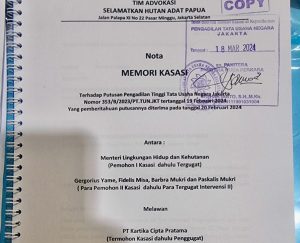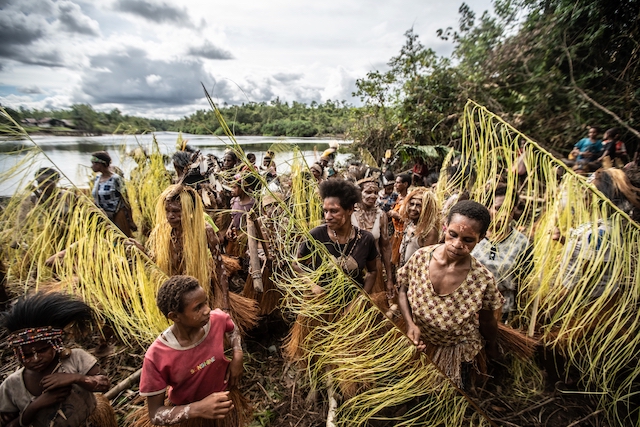Vast expansion of oil palm plantation businesses and the largest forest conversion permits for palm oil businesses in the Papua region occurred during the Presidential term of Susilo Bambang Yudhoyono – Jusuf Kalla (2009 – 2014), the area size was up to 900,291 hectares or 9,002.91 km2 and the largest target forest was in Boven Digoel Regency, now in South Papua Province. The Land of Papua is desired and targeted by investors and transnational companies.
The West Sumatran entrepreneur and owner of Menara Group, Chairul Anhar, claims to possess a forest conversion permit covering an area of 2,800 km2 and/or more than 25 percent of the total permit area issued by Zulkifli Hasan, the then Minister of Forestry and a PAN politician to date. The permit area is more than four times the area of DKI Jakarta Province of 661.5 km2. The forest where the Awyu tribe is residing will be converted into the largest oil palm plantation in Indonesia through the Tanah Merah Project, which will be operated by seven companies, namely PT Megakarya Jaya Raya (MJR), PT Kartika Cipta Pratama (KCP), PT Graha Kencana Mulia (GKM), PT Energi Samudera Kencana (ESK), PT Trimegah Karya Utama (TKU), PT Manunggal Sukses Mandiri (MSM) and PT Nabati Usaha Mandiri (NUM). In its development, the shareholding in the companies has been transferred to new owners, sold to other companies which are domiciled in the Middle East, Singapore and Malaysia.
The Tanah Merah Project operation which will destroy Papua’s forests is revealed to be brimmed with legal problems and corruption scandals, involving officials and conglomerate actors (the Gecko Project and Tempo, 2018), for example, the absence of AMDAL documents, use of forged official signatures and fraudulent practice of giving out money intended to gain community support, absence of negotiation and free consent from the community, etc. The Awyu indigenous people in the Kia, Jair, Mandobo and Fofi districts have repeatedly sent protest letters and met with the government to express their rejection of the companies’ operations. The Boven Digoel Regional Government had even revoked plantation business permits from several companies and transferred them to new companies (2015).
In early 2022, the Minister of Environment and Forestry (LHK) issued decision Number SK.01/MENLHK/SETJEN/KUM.1/1/2022 regarding Revocation of Forest Area Concession Permits, which revoked the concession permits of hundreds of companies in Indonesia, including seven companies in the Tanah Merah Project. Subsequently, the Minister of Environment and Forestry issued Decision Number: SK.1150/MENLHK/SETJEN/PLA.2/11/2022 regarding Control and Orderly Arrangement of Forest Area Concession in the name of PT Megakarya Jaya Raya (MJR) and Decision Number: SK.1157/MENLHK/SETJEN/PLA.2/11/2022, Control and Orderly Arrangement of Forest Area Concession in the name of PT Kartika Cipta Pratama (KCP), the two decisions are dated 14 November 2022. One of the arguments used by the Minister of Environment and Forestry is that the legal action to control permits is in accordance with the Indonesian government’s commitment in fulfilling the Nationally Determined Contribution (NDC) and the Paris Agreement, to control deforestation.
PT MJR is a company which has a forest area concession permit covering 39,505 hectares, while PT KCP has an area of 39,338 ha. However, from 2012 to 2022, both companies have only managed to clear land and develop an oil palm plantation business for an area of 8,130 ha. In March 2023, MJR and KCP rejected the decisions on business permit control and challenged the Minister of Environment and Forestry’s decision through the Jakarta State Administrative Court (PTUN).
The affected Awyu indigenous community and the land owners in the companies’ concession areas agree with the Ministry of Environment and Forestry’s policy of controlling and revoking the companies’ permits. They oppose the companies’ plans and operations due to the impact on lives and the environment. They also fought back by becoming Defendant-Intervenor II in the two lawsuits, namely Maximus Nawisi/Aisano and Adolfinas Sifi, from Afu Village, Fofi District, Boven Digoel Regency, against the palm oil company, PT Megakarya Jaya Raya (MJR), and Gergorius Yame, Fidelis Misa, Barbra Mukri and Paskalis Mukri, from Yare Village, Fofi District, Boven Digoel Regency, against PT Kartika Cipta Pratama (KCP).
Barbra Mukri, an Awyu Tribe woman, stated that the benefit of forests and customary land is to serve as a common living space for the clan, which are utilized for hunting wild animals, planting crops, harvesting forest products for food, medicine, culture, economy and developing customary knowledge. The forests have high biodiversity which, if converted into oil palm plantations, will eliminate the functions and carrying capacity of the natural environment.
The Panel of Judges of PTUN Jakarta (September 2023) in its decision rejected the lawsuit by the companies, MJR and KCP, and Plaintiff-Intervenor II on behalf of Yefioho Dohona Ahawang cooperative. The decision provides hope and the state’s efforts to respect, protect and fulfill the rights of indigenous peoples. However, PT MJR and KCP continued to resist and filed an appeal with the Jakarta State Administrative High Court (PT TUN). The deliberation meeting of the Panel of Judges of PT TUN Jakarta (February 2024) granted the appeal by PT MJR and PT KCP, annulled PTUN Jakarta’s decision, and declared invalid Decision of the Minister of Environment and Forestry Number SK.1150/MENLHK/SETJEN/PLA.2/11/2022 regarding Control and Orderly Arrangement of Forest Area Concession in the name of PT Megakarya Jaya Raya and decision Number: SK.1157/MENLHK/SETJEN/PLA.2/11/2022, Control and Orderly Arrangement of Forest Area Concession in the name of PT Kartika Cipta Pratama.

Against the appeal decision, the Awyu tribe, through their attorney, the Save Papuan Customary Forests Coalition, filed a cassation, as also filed by the Ministry of Environment and Forestry. The Coalition deems that the considerations in the appeal decision are contrary to the agrarian reform movement. The Cassation memorandum on the two cases decided upon by PT TUN Jakarta was filed on Monday, 18 March 2024 through the registrar’s office of the State Administrative Court.
“The fundamental error of the panel of appeal judges in its decision was the terminology of “forest rights” to the state. The judges deem that if the state concedes a forest area, it is the same as giving up the “forest rights”, thus the state no longer have any ties to the forest nor the authority to reorganize an area that does not have forest status. The judges’ considerations revived the Dutch colonial domain principle. The Domain principle provides that the state is a public power organization as well as a civil legal entity which owns land. “The Dutch colonialists deemed that forests and forest products were the domain of the state, which then stipulated the Dutch East Indies territory in its ownership,” explained Tigor Hutapea, one of the attorneys from Yayasan Pusaka Bentala Rakyat.
The panel of appeal judges’ consideration is contrary to the constitutional rights provided for in article 33 paragraph 3 of the 1945 Constitution. The constitution regulates the state’s right to control, the constitutional court through decision Number 001-002-022/PUU-I/2023 provides an interpretation that the phrase, controlled by the state, must be interpreted to include the meaning of control by the state in a broad sense, which originates and arises from the concept of sovereignty of the Indonesian people over all sources of wealth, earth and water and natural resources contained therein, including the meaning of public ownership of such sources of wealth by the people collectively.
The Attorney, Tigor Hutapea, elaborated that the people are collectively constructed by the 1945 Constitution to give a mandate to the state to implement policies (beleid) and administrative acts (bestuursdaad), regulation (regelendaad), management (beheersdaad) and supervision (toezichtoudensdaad) for the greatest prosperity of the people. The administrative function (bestuursdaad) by the state is carried out by the government with its authority to issue and revoke permit (vergunning), license (licentie) and concession (concessie) facilities. The regulatory function by the state (regelendaad) is carried out through legislative authority by the People’s Legislative Assembly (DPR) together with the government, and regulation by the government (executive), the management function (beheersdaad) is carried out through shareholding mechanism and/or through involvement in the management of State-Owned Enterprises as an institutional instrument through which the state C.q the Government exercises its control over its sources of wealth to be utilized for the greatest prosperity of the people.
Similarly, the function of supervision by the state (toezichthoudensdaad) is carried out by the state c.q. the government in the context of supervision and control in order that the implementation of the state’s possession of production branches which are important and/or which control the lives of many people is truly carried out for the greatest prosperity of all the people.
“Based on the arguments mentioned above, the 1945 Constitution and other laws and regulations do not introduce ownership (eigensdaad) of forest rights for the state. “The state is vested with the function to regulate and administer for the prosperity of the people,” Tigor Hutapea affirmed.
In the cassation memorandum document submitted, the coalition wishes that the Supreme Court Justices would correct the hermeneutical error of forest rights in the High Court’s appeal decision. The state’s actions of controlling and orderly arranging as well as revoking permits in PT Kartika Cipta Pratama and PT Megakarya Jaya Raya’s lawsuit are already appropriate in accordance with the authority granted by the 1945 Constitution.
We hope that the Supreme Court Justices in the cassation would correct the errors in the appeal decision, and thereafter issue a decision which considers the aspect of justice for the indigenous peoples and the environment.
Ank, Mar 2024


